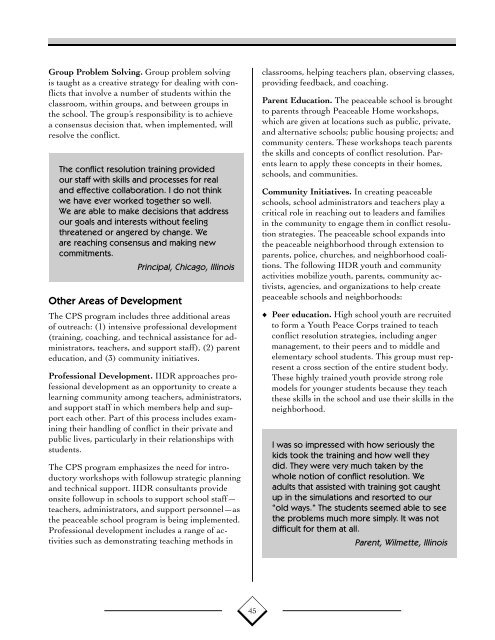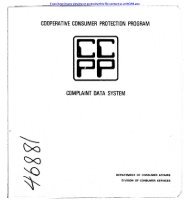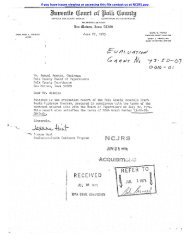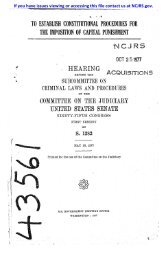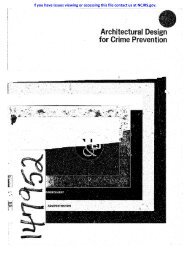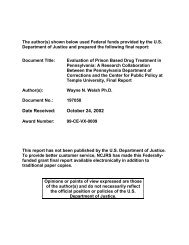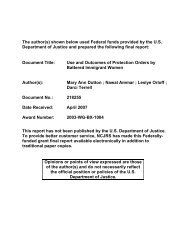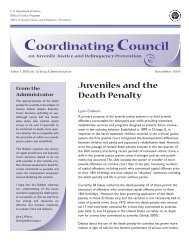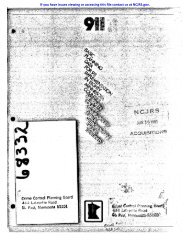Conflict Resolution Education - National Criminal Justice Reference ...
Conflict Resolution Education - National Criminal Justice Reference ...
Conflict Resolution Education - National Criminal Justice Reference ...
You also want an ePaper? Increase the reach of your titles
YUMPU automatically turns print PDFs into web optimized ePapers that Google loves.
Group Problem Solving. Group problem solving<br />
is taught as a creative strategy for dealing with conflicts<br />
that involve a number of students within the<br />
classroom, within groups, and between groups in<br />
the school. The group’s responsibility is to achieve<br />
a consensus decision that, when implemented, will<br />
resolve the conflict.<br />
The conflict resolution training provided<br />
our staff with skills and processes for real<br />
and effective collaboration. I do not think<br />
we have ever worked together so well.<br />
We are able to make decisions that address<br />
our goals and interests without feeling<br />
threatened or angered by change. We<br />
are reaching consensus and making new<br />
commitments.<br />
Principal, Chicago, Illinois<br />
Other Areas of Development<br />
The CPS program includes three additional areas<br />
of outreach: (1) intensive professional development<br />
(training, coaching, and technical assistance for administrators,<br />
teachers, and support staff), (2) parent<br />
education, and (3) community initiatives.<br />
Professional Development. IIDR approaches professional<br />
development as an opportunity to create a<br />
learning community among teachers, administrators,<br />
and support staff in which members help and support<br />
each other. Part of this process includes examining<br />
their handling of conflict in their private and<br />
public lives, particularly in their relationships with<br />
students.<br />
The CPS program emphasizes the need for introductory<br />
workshops with followup strategic planning<br />
and technical support. IIDR consultants provide<br />
onsite followup in schools to support school staff—<br />
teachers, administrators, and support personnel—as<br />
the peaceable school program is being implemented.<br />
Professional development includes a range of activities<br />
such as demonstrating teaching methods in<br />
45<br />
classrooms, helping teachers plan, observing classes,<br />
providing feedback, and coaching.<br />
Parent <strong>Education</strong>. The peaceable school is brought<br />
to parents through Peaceable Home workshops,<br />
which are given at locations such as public, private,<br />
and alternative schools; public housing projects; and<br />
community centers. These workshops teach parents<br />
the skills and concepts of conflict resolution. Parents<br />
learn to apply these concepts in their homes,<br />
schools, and communities.<br />
Community Initiatives. In creating peaceable<br />
schools, school administrators and teachers play a<br />
critical role in reaching out to leaders and families<br />
in the community to engage them in conflict resolution<br />
strategies. The peaceable school expands into<br />
the peaceable neighborhood through extension to<br />
parents, police, churches, and neighborhood coalitions.<br />
The following IIDR youth and community<br />
activities mobilize youth, parents, community activists,<br />
agencies, and organizations to help create<br />
peaceable schools and neighborhoods:<br />
♦ Peer education. High school youth are recruited<br />
to form a Youth Peace Corps trained to teach<br />
conflict resolution strategies, including anger<br />
management, to their peers and to middle and<br />
elementary school students. This group must represent<br />
a cross section of the entire student body.<br />
These highly trained youth provide strong role<br />
models for younger students because they teach<br />
these skills in the school and use their skills in the<br />
neighborhood.<br />
I was so impressed with how seriously the<br />
kids took the training and how well they<br />
did. They were very much taken by the<br />
whole notion of conflict resolution. We<br />
adults that assisted with training got caught<br />
up in the simulations and resorted to our<br />
“old ways.” The students seemed able to see<br />
the problems much more simply. It was not<br />
difficult for them at all.<br />
Parent, Wilmette, Illinois


